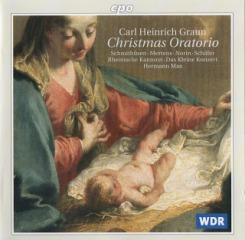Carl Heinrich Graun – Christmas Oratorio (Hermann Max) [1999]
Carl Heinrich Graun – Christmas Oratorio (Hermann Max) [1999]

1. Chor: Mache Dich Auf, Werde Licht 2. Arie: Erscheine Doch Und Komm, Erbarmungsvolle Liebe 3. Accompagnato: So Mache Dich Denn Auf 4. Choral: Gott Sei Dank Durch Alle Welt 5. Chor: Uns Ist Ein Kind Geboren 6. Rezitativ: Geh, Taumelnde Vernunft 7. Arie: Abgrund Krache, Tod Erzittre 8. Rezitativ: O Wunderbares Kind 9. Arie: Die Sterblichkeit Gebiert Das Leben 10. Accompagnato: So Komm; O Sohn Der Ewigkeit 11. Arie: Erfülle Mich, Du Holdes Wesen 12. Choral: Wie Soll Ich Dich Empfangen 13. Rezitativ: Und Maria Gebar Ihren Ersten Sohn 14. Arie: Zeit Und Stunde Sind Erfüllt 15. Chor: Euch Ist Heute Der Heiland Geboren 16. Rezitativ: Mein Geist, Getrost, Sei Ohne Sorgen 17. Choral: Ein Kindelein So Löbelich 18. Rezitativ: Und Die Hirten Kamen Eilend 19. Arie: Ew'ger Sohn, Erhaltner Segen 20. Rezitativ: Wohlan, Es Soll Mir Abrahams Gesetzter Glaube 21. Duett: Herr, In Frieden Will Ich Sterben 22. Choral: Lob, Preis Und Dank, Herr Jesu Christ 23. Chor: Eilt, Ihr Seelen, Folgt Den Weisen Ingrid Schmithüsen - soprano Lena Susanne Norin - alto Markus Schäfer - tenor Klaus Mertens - baritone Rheinische Kantorei Das Kleine Konzert Hermann Max – conductor
Alas, too late for the Christmas season, but affording a Lenten palliative, come three 18th-century Christmas Oratorios. Two of them, by Gottfried Heinrich Stölzel and Carl Heinrich Graun, belong to the late Baroque while the third, by Joseph Eybler, dates from the last decade of the century. Stölzel was court music director at Gotha for almost 30 years and this recording commemorates the 250th anniversary of his death in 1749. Bach thought well of him, and included his beautiful aria ‘Bist du bei mir’ in the Clavierbüchlein for his wife Anna Magdalena. Stölzel’s Oratorio (1736) consists of three cantatas for the first three days of Christmas. The music is skilfully worked and often engaging though, in the end, unmemorable. A mainly strong solo line-up and a variably secure instrumental ensemble are affectionately directed by Ludger Rémy. Though dating from approximately the same time as Stölzel’s work, Graun’s captivating Oratorio embraces the up-to-date ‘galant’ idiom, with a profusion of engaging melodies, simpler accompaniments and an airier treatment of the chorale. Its expressive terms of reference call to mind Telemann’s later oratorios, many of which were written well after Graun’s innovative piece. The performance under the direction of Hermann Max is on a higher level than the Stölzel and should afford readers unqualified pleasure. Eybler was a contemporary of Beethoven. He wrote this, his first oratorio, in 1794 for the Musicians Retirement Institute in Vienna. The stylistic terms of reference are varied and far-flung but, though often suggesting in turn Gluck, Haydn, Mozart and Beethoven, Eybler nevertheless speaks with his own distinctive inflections. A new and pleasing encounter, performed with rough-edged vigour and eager bravura. ---Nicholas Anderson, classical-music.com
download (mp3 @320 kbs):
uploaded yandex 4shared mega solidfiles zalivalka cloudmailru filecloudio oboom uplea








